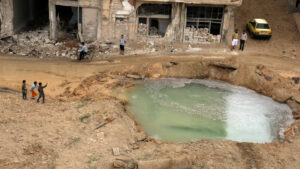Ten years have passed since the horrifying sarin gas attack that shook the world’s conscience and scarred the lives of countless Syrians. On August 21, 2013, the suburbs of Damascus, Syria, became the epicenter of a tragedy that claimed the lives of over 1,400 people. The attack marked a turning point in the ongoing Syrian war, leaving survivors and the global community grappling with the aftermath and seeking justice for the victims.
A Growing Mountain of Evidence:
The Ghouta attack remains one of the most thoroughly documented atrocities in history. multitude of photographs and videos captured the immediate aftermath, while volunteer documentarians, journalists, medical personnel, and residents rushed to record the devastating events. The United Nations dispatched a team to gather samples and testimonies, piecing together a mosaic of horror that pointed unmistakably toward the Syrian government’s involvement.
As the years passed, more evidence emerged, implicating the Syrian regime further. Intelligence agencies, weapons inspectors, and independent groups collected a trove of documents, witness statements, intercepted communications, and other data, underscoring the government’s culpability. Despite the mounting evidence, justice remained elusive, leaving survivors and their advocates frustrated and determined to seek accountability.
A Web of Complications:
The journey toward justice has been fraught with obstacles. The primary hindrance has been Russia, Syria’s key ally, which has utilized its influence within the United Nations Security Council to thwart official investigations. While Russia’s role is pivotal, criticism has also been directed at Western nations for their inadequate response to the attack and the subsequent use of chemical weapons.
The attack, occurring on the outskirts of the Syrian capital within easy reach of media attention, shocked the world. However, the lack of decisive action allowed the Syrian government to shift tactics, employing chlorine gas to continue its lethal onslaught. Meanwhile, international attention has waned, with numerous Arab countries opting to normalize relations with Syria.
Survivors’ Unwavering Pursuit of Justice:
Despite the challenges and setbacks, survivors of the Ghouta attack refuse to surrender their quest for justice. For them, August 21 symbolizes not just a singular tragedy but a representation of countless war crimes perpetrated during the prolonged war. It embodies their determination to see President Bashar al-Assad and his top officials held accountable for their crimes against humanity.
A Missed Opportunity:
The timing of the 2013 attack couldn’t have been worse for Syria. The world watched as U.N. inspectors were in Damascus to investigate allegations of chemical weapons use. The decision to launch such a massive attack under these circumstances baffled even the investigators themselves. Syria and Russia attempted to shift blame, alleging rebel involvement in a false-flag operation.
However, investigations subsequently exposed the truth. Remnants of rockets pointed to government-controlled launch sites, dispelling false narratives. The evidence was irrefutable, yet accountability remained elusive.
A Fractured Path to Justice:
The Organization for the Prohibition of Chemical Weapons (OPCW) launched investigations into Syria’s chemical weapons program, but progress has stalled, particularly regarding the Ghouta attack. The complexity of diplomatic agreements further hampered the process. The Obama administration’s decision not to militarily intervene and instead focus on disarmament allowed Syria to escape acknowledgment of its role in the massacre.
As a consequence, Damascus continued to employ chemical weapons, albeit less potent ones, with little international response. The lack of accountability has reinforced the perception that those in power can act with impunity.
A decade after the horrific Ghouta attack, the survivors and the global community continue to demand justice. The evidence is overwhelming, yet international politics and diplomatic complexities have impeded formal proceedings. The tragedy serves as a reminder of the urgent need to address the plight of survivors and to hold perpetrators accountable for their actions. Until justice is served, the victims’ voices will remain a testament to the enduring human spirit in the face of unspeakable horrors.


